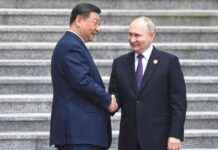In recent times, a growing number of individuals in Washington DC have sought to rationalize the Trump Administration’s support for Vladimir Putin and his actions in the Russo-Ukrainian War. They have turned to the theories of international relations student John Mearsheimer, drawing parallels from the ancient Athenian chronicler Thucydides and his account of the Peloponnesian War. These ideas, influenced by the dark and amoral view on human relations by English political theorist Thomas Hobbes, highlight the constant pursuit of power by states, especially great powers, to ensure their survival in the absence of supranational protection.
Mearsheimer’s interpretation of Thucydides, framed through a Hobbesian lens, emphasizes the anarchic nature of the international system, pushing states to seek hegemony for security. While global dominance may be the ultimate goal, most states settle for regional hegemony. In this context, Mearsheimer has justified Putin’s actions in Crimea and eastern Ukraine as strategic moves towards regional hegemony. The recent full-scale invasion of Ukraine in 2022 was seen as a necessary step to prevent Ukraine from aligning with NATO, which would threaten Russia’s position as a major power.
Over time, Mearsheimer’s perspective has gained traction in academia, media, and even within the US government. This view, rooted in power dynamics and self-preservation, has painted Thucydides as a symbol of a world where might dictates right and greatness is the ultimate pursuit. As discussions around the Russo-Ukrainian War continue, there is a call to reflect on the lessons of history, particularly through the lens of Thucydides and the rise and fall of Athens in the Peloponnesian War.
Thucydides’ Morality Play
Thucydides’ narrative begins with Pericles, the leader of Athens, extolling the virtues of Athenian exceptionalism, boasting of naval prowess, military strength, powerful alliances, and democratic ideals. However, as the conflict progresses, Athens’ hubris leads to arrogance, imperialistic tendencies, and internal strife fueled by populist demagogues. The city-state’s overreach, failed expeditions, and disregard for allies culminate in its eventual defeat by the combined forces of Sparta, Corinth, and Thebes. The downfall of Athens serves as a cautionary tale of unchecked power and moral decay.
As we navigate the complexities of modern geopolitics, the story of Athens serves as a stark reminder of the dangers of unchecked ambition and the erosion of democratic values. Just as Darius, the Persian Emperor, admonished his servant to “Remember the Athenians,” we too must heed the lessons of history to avoid repeating past mistakes.
Walter Zaryckyj, Executive Director of the Center for US-Ukrainian Relations, emphasizes the importance of understanding and learning from historical narratives to inform contemporary foreign policy decisions. By engaging in dialogue and exchange between nations, we can forge a path towards a more stable and cooperative global community. As we reflect on the legacy of Athens and its tragic fate, let us strive to build a world guided by wisdom, empathy, and a commitment to peace and justice.

















